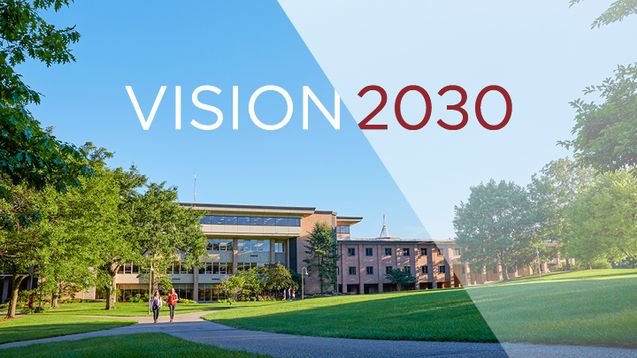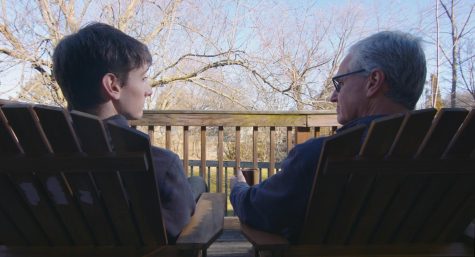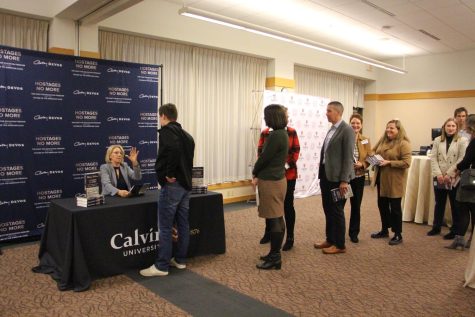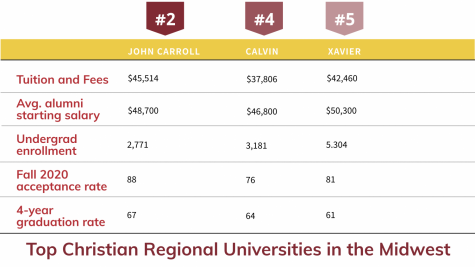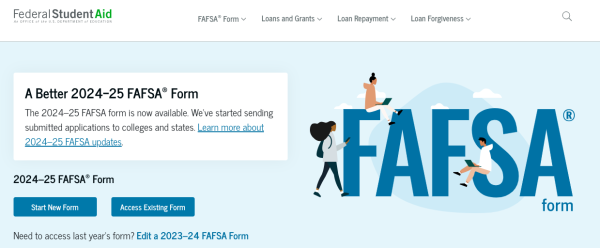Revised vision statement reflects community feedback
The Vision 2030 team recently released an updated draft of Calvin’s vision statement, incorporating feedback from listening sessions with the Calvin community.
The team spent the first half of this semester discussing the original draft with faculty, students and staff, as well as other groups like the alumni board. This new draft is a result of the feedback from those discussions.
The original draft’s first sentence, “Calvin is called to promote the welfare of the city and the healing of the world,” elicited mixed reactions, according to Todd Hubers, vice president for people, strategy and technology. While some people appreciated “the poetry of it” and felt that it provided a “really nice bridge between the mission statement and the vision statement,” others found its meaning and placement confusing.
To clarify that Calvin sees its call to justice and healing as part of its Reformed Christian faith commitment, the vision team moved the “welfare of the city” line to the sentence about Reformed faith. This change also emphasized that Calvin’s commitment to faith is “not just your head, but it’s also your heart and your body,” Hubers said.
The sentence about Calvin’s Reformed identity, which originally read, in part, “we remain rooted in a Reformed faith that seeks understanding,” was changed to “Calvin University will be animated by a Reformed Christian faith that seeks understanding.”
Hubers said that, although the vision team “liked the imagery of being ‘rooted in,’” they made the change in order to make this sentence as forward-looking as the first two sentences of the statement.
Almost all of the original statement’s fifth sentence was removed after it received negative feedback for its wordiness — particularly, Hubers said, from English department faculty.
“It was doing too many things; it was confusing,” he said.
The one part of that sentence that was kept — “across ecumenical and cultural differences” — was moved to the second sentence, and “ecumenical” was changed to “religious.”
The first draft ended with a list of activities traditionally associated with faculty: “teaching, scholarship, and service.” The new draft adds “learning” and “worship” to the list.
The purpose of these additions was “to help more members of the community to see themselves [in the statement],” Hubers said. “We’re really seeing each of us as learners: students, faculty, staff.”
Three of the four paired values listed below the vision statement are the same as in the first draft, while the new pair “Boldness & Humility” replaced “Excellence and Community.”
According to Hubers, the committee received feedback that “Excellence and Community” didn’t fit well with the other three value pairs.
The committee felt that “humility” was missing from the first draft started looking for another value to pair it with. Hubers said one faculty member suggested “boldness,” noting, “When you look … at what the New Testament church was called to, they were called to boldness. They weren’t called to excellence.”
Faculty senate will discuss the new draft at their meeting next Tuesday, April 24, and it will go to the board of trustees for an approval vote at their May meeting. If it is approved, Calvin administrators will start working on the next strategic plan, which will lay out how to work toward the vision for the next five years.
___________________________________________________________________________________
Original statement:
Calvin is called to promote the welfare of the city and the healing of the world. By 2030, Calvin will be a Christian liberal arts university with an expanded global influence. We envision Calvin University as a trusted partner for learning that engages the academy, the church, and the world at large.
In all things, we remain rooted in a Reformed faith that seeks understanding. We reaffirm our invitation to the great conversations across all domains of learning and across ecumenical and cultural differences. And, we celebrate learning that forms us through teaching, scholarship, and service.
Revised statement:
By 2030, Calvin will become a Christian liberal arts university with an expanded global influence. We envision Calvin University as a trustworthy partner for learning across religious and cultural differences and throughout the academy, the church, and the world.
Calvin University will be animated by a Reformed Christian faith that seeks understanding and promotes the welfare of the city and the healing of the world. We welcome all who are compelled by God’s work of renewal to join us in the formative pursuits of lifelong learning, teaching, scholarship, worship, and service.



